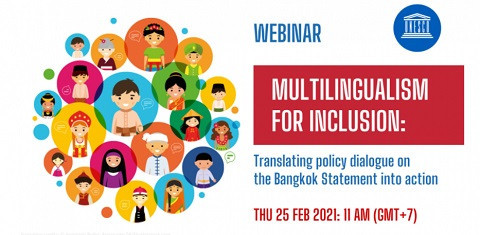
GCED Basic Search Form
Quick Search
현재 위치
Events

The Asia-Pacific is home to half of the world’s 7,117 living languages, each embedded with unique expressions and representing a diversity of peoples. While 40 per cent of the global population does not have access to education in a language they speak or understand, progress has been made through mother tongue-based multilingual education (MTB MLE) in early years of schooling, along with concerted multilateral efforts towards an understanding of the importance of learning in mother languages. International Mother Language Day on 21 February expands upon these efforts, with the goal of promoting linguistic and cultural diversity and multilingualism.
The International Day was approved at the 1999 UNESCO General Conference and has been celebrated globally since 2000. It garnered further support when the UN General Assembly welcomed the proclamation of the day in 20024 and, in 2007, called upon Member States to ‘promote the preservation and protection of all languages used by peoples around the world’. The latter meeting included a discussion designating 2008 as International Year of Languages. A decade later, the United Nations General Assembly declared 2019 as International Year of Indigenous Languages and 2022-32 as the Decade of Indigenous Languages.
The theme for International Mother Language Day 2021, ‘Fostering multilingualism for inclusion in education and society’, takes this further by recognizing that multilingualism can advance inclusion and the Sustainable Development Goals (SDG) focus on leaving no one behind. This is particularly relevant considering the global trend towards increasingly multilingual landscapes where ethnic minority, migrant, national and international languages co-exist. As such, there is a need to enhance inclusion through collaborative initiatives, particularly related to language in education.
The Bangkok Statement on Language and Inclusion was created during the 3rd high-level policy forum on multilingual education convened in parallel to the Inclusion, Mobility and Multilingual Education Conference: Exploring the Role of Languages for Education and Development on 25 September 2019 in Bangkok. This meeting follows a longstanding history of collaborative high-level discussions including but not limited to the Jomtien World Declaration on Education for All (1990), the Suzhou Conclusions (2014) and the Asia-Pacific Statement on Education Beyond 2015 (2014).
The Bangkok Statement on Language and Inclusion emphasizes the importance of multilingual education in achieving the SDGs. Viewing people from all languages and cultures as valued citizens is essential to ‘promote peaceful and inclusive societies for sustainable development’ (SDG 16).
In multilingual environments, proficiency in more than one language is a prerequisite to decent work for the individual and economic growth for the nation (SDG 8). Children, youth and adults, however, may not be able to build language proficiency if they lack understanding of the language used by teachers, textbooks and digital learning resources (SDGs 4.4, 4.6). In such cases, school language policies can act as barriers, preventing access to inclusive and equitable quality education (SDG 4) and thus exacerbating social inequality (SDG 10).
With language(s) of instruction impacting learners at several key junctures, language policies at each level play an important role in creating a positive and inclusive learning environment, while fostering enduring peace (SDG 16), gender equality (SDG 4.5) and sustainable development (SDG 4.7).
While underscoring the role of multilingual education in achieving the 2030 SDGs, the Bangkok Statement on Language and Inclusion recommends specific action items that educational stakeholders may adopt to address inequalities in language(s)-in-education policies and practices in their respective countries.
The document calls for bridging the gap between research and practice through evidence-based policies on multilingual education in the following ways: 1) highlighting language(s)-of-instruction issues; 2) fostering investment for quality multilingual education; 3) enhancing the quality of multilingual education; 4) diversifying the teacher workforce and building teacher capacity; 5) gathering data disaggregated by home or first language; 6) strengthening partnerships with relevant stakeholders and partners; and 7) preparing national progress reports. This action plan works toward the realization of ‘inclusive and equitable quality education’ (SDG 4) in relation to the language needs of all learners.
The second session of regional webinar series will focus on implementing the action plan items of the Bangkok Statement on Language and Inclusion. Each panel speaker will provide various examples of mother tongue-based multilingual education programmes and language(s)-in-education policies that are congruent with the Bangkok Statement.
As such, the webinar will create a dialogue among educational stakeholders within the Asia-Pacific region on how the Bangkok Statement can be helpful for government officials, policymakers, and practitioners. Additionally, this webinar will feature the launch of a guidance note on ‘Ensuring inclusive education for ethnolinguistic minority children in the COVID-19 era’.
Objectives
- To raise awareness regarding the importance of MTB MLE to achieve inclusive education for all learners.
- To understand practical policy and programme applications of the Bangkok Statement for fostering multilingualism for inclusion in education and society.
- To catalyze multilateral engagement and cooperation in implementing MTB MLE programmes in the Asia-Pacific region.
Target Audience
The target audience for the webinar includes regional, national and international level education stakeholders (including both policymakers and implementers) interested in the applications of the Bangkok Statement on Language and Inclusion for inclusive multilingual education policies and programmes.
Working Language
English will be the working language of the webinar.
Dates and Format
Date: Thursday, 25 February 2021 Time: 11.00 – 12.30 (Bangkok time)
Format: Zoom
Registration
Registration is free and required in advance. Once you register, a unique join URL will be sent to your email.
Registration link: https://unesco-org.zoom.us/webinar/register/WN_lnmO4TuvR52KXBqtTcGPjA
For more Information
Asia-Pacific Multilingual Education Working Group Secretariat E-mail: ap.mlewg@gmail.com
URL:
